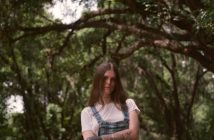As minimal as its plain black cover and as bare as its title, this latest offering from Nick Cave & The Bad Seeds finds the eponymous Aussie at his free-flowing and enigmatic best.
-
8
I’m reluctant to consign myself to the ranks of empathisers who have heaped gushing praise on this album in explicit reference to the traumatic event that belies it – that of the death of Nick Cave’s son Arthur, who fell from a cliff in Brighton last summer – as such praise can often come off as hollow and meaningless, just like when an artist dies and suddenly everybody is, and of course always was, their biggest fan. On a personal note, I now hesitate before putting on the Bowie t-shirt that I got aged 14 and have worn lovingly ever since, for fear of being silently labeled a phoney post-mortemite since his January passing. I even got grilled by a stranger upon my singing along to ‘Life On Mars’ at a mate’s 21st and was forced to passionately defend my long-standing fandom.
Basically put, I’m aware of the slippery slope inherent in that potent combination of death and art, and wish to avoid the snarling trap of empty-handed falsities that lies therein. However, it is so very hard to dispassionately separate the two factors on Skeleton Tree (and indeed on its companion film One More Time With Feeling). The former has irrevocably seeped into the fabric of the latter, staining it permanently in the process. It’s in every word that Cave sings; every inflection of his frail, threadbare baritone. Such is the emotion in his voice that it is quite impossible to escape the pain and the suffering that it embodies. Even when the lyrics are wholly unrelated to the incident, our minds cannot help but twist their meaning squarely back to the sudden loss of Cave’s son. So, when there are moments of obvious reference to the event, it is so overwhelming in its emotional impact that you may just – as I did – shed a tear or two for Cave and his family.
Such a moment occurs at the close of ‘Distant Sky,’ when Danish soprano Else Torp sings, “Soon the children will be rising, will be rising / This is not for our eyes.” The implication that no parent should be made to outlive their own child is almost unbearable to hear, especially when intoned with such purity. It is interesting to note that Cave very rarely allows another artist to sing on his tracks – the primary exceptions being his duets with Kylie Minogue and PJ Harvey on Murder Ballads – so the decision to employ Torp here is not one that would’ve been taken lightly. It’s easy to see why, though: the ethereal beauty that she brings to the lyrics perfectly fits their transcendental spirituality, and perhaps Cave recognises that they needed to come from a voice other than his own in order to reach their celestial end. And reach it they do, wonderfully.
Musically we’re in a very sparse, murky world. Dominated from the outset of opener ‘Jesus Alone’ by sneering synths and seething strings, the mood is immediately one of oppression and claustrophobia. Cave here seems unconcerned by the strictures of tempo and rhythm, to the extent that he often abandons even the most basic adherence to syllabic placement. Drawling freely over barlines and with phrases bumping awkwardly into one another, an atmosphere of failing improvisation or even disdainful carelessness pervades the album, often making it an uncomfortably disjointed listen. Countering this is the smoothness of some of the arrangements, with gloriously rich choral and string voicings floating airily into the otherwise dark and brooding texture. Harmonically, it’s disarmingly plain, with big fat pop chords that crash in unabashedly on their predicted downbeats. All of the above make for an overall effect of raw, soul-baring simplicity that could perhaps be seen as the musical equivalent to an Ernest Hemingway novel, allowing the pure emotions to breathe freely, unconstrained by the trappings of verbose language that often hamper more insecure artists, by avoiding decadent linguistics. Cave has a confidence in his art that means he needn’t dress it up in frilly garments, acknowledging that the unadorned article is far more beautiful in its bare nudity than any amount of prissy prettifying could ever muster.
Skeleton Treeis out now via Bad Seed Ltd




